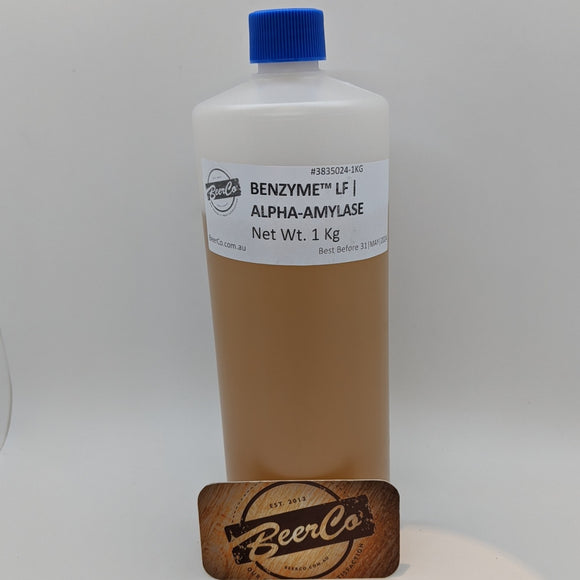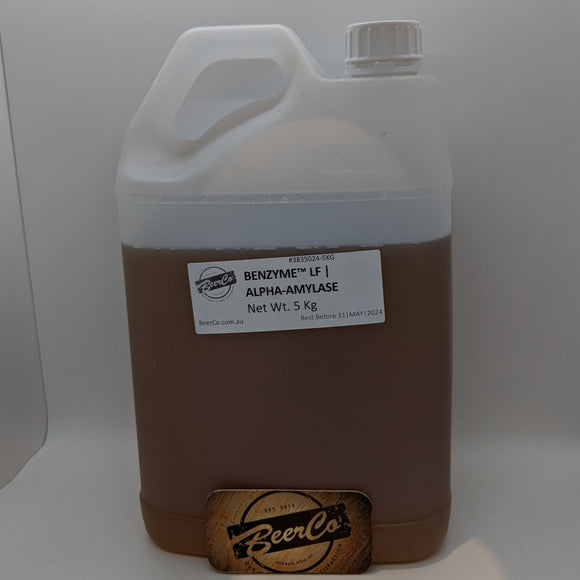Benzyme LF is a unique, heat-stable alpha-amylase for broad pH liquefaction. It gives you superior viscosity break with no calcium requirement.
Benzyme LF delivers efficient liquefaction at very high mash DS (30–35%). It also gives you lower mash viscosity and smoother downstream processing.
In this product the key enzyme activity is provided by endo-amylase that hydrolyzes (1,4)-alpha-D-glucosidic linkages in starch polysaccharides.
Pack Sizes:
- 1 Kg Bottle
- 5 Kg Bottle (SAVE 20% OFF 1Kg Price)
- 25 Kg Canister Novozymes Liquoflow® Go 2X
Key Benefits:
Low-pH Tolerance
This product operates at low pH. That allows you to make more use of backset and reduces the need to adjust sodium hydroxide (NaOH) pH. That means less sodium (Na) stress on yeast. Operating at low pH also allows you to save on energy and chemicals.
Viscosity Reduction
High viscosity causes a range of problems in your process. These include channeling through the stirred tanks. Pumps, heat exchangers, jet cookers and agitation all run better at low viscosity. Lower viscosity also allows you to operate at higher levels of dry solids. This product reduces viscosity for smoother processing that's better able to withstand variations.
Thermostability
In some regions and processes, cooling of the jet-cooked mash (110+ºC) is not optimal. Non-thermostable alpha-amylases lose their activity at these high temperatures. This thermostable product keeps working in your liquefaction process, even at high temperatures.
Suited to no-jet-cooking processes
This product delivers aggressive hydrolysis and high viscosity reduction. That makes it suitable for operations that don't use jet cookers.
Less-residual starch
This product delivers efficient liquefaction to convert more starch into dextrins. That means there is less residual starch at the end of your Saccharification (SSF) process.
Higher yield
This advanced, thermostable enzyme delivers aggressive hydrolysis. It can also operate at lower pH to potentially reduce sugar loss to the Maillard reaction. The result is higher extract yield and profitability for your plant.
How thermostable α-amylases work in distilling liquefaction
After mashing and gelatinization, distillers add thermostable α-amylases to the cooker. α-amylases hydrolyze the 1,4-α-glucosidic linkages in amylose and amylopectin. That yields soluble short-chain dextrins. These are more suited to saccharification to fermentable glucose or maltose. In that way, thermostable α-amylases help ensure complete starch conversion.
Making beverage alcohol involves converting starch into fermentable sugars. Yeast then transforms these sugars into alcohol. Liquefaction of starch is the first enzymatic step in this process. Liquefaction prepares starch for further breakdown to produce fermentable sugars. The liquefaction step is critical to the overall efficiency of a distiller's process. Effective liquefaction ensures complete starch conversion to fermentable sugars.
In water below 50°C, unmodified starch granules are generally insoluble. To make them soluble, distillers use a process known as gelatinization. They heat the raw material - whether starch, potatoes or grain - usually under pressure. That makes the starch granules absorb a large amount of water and swell to many times their original size. Then the pressure is suddenly released, disrupting the previously organized starch structure. The starch granules lose their individual crystalline structure to become a viscous liquid gel.
Expanding and opening compact starch granules in this way prepares them for liquefaction. In liquefaction, α-amylases hydrolyze the gelatinized starch to yield soluble dextrins. This converts starch in the mash into a free-flowing liquid. Heat-stable α-amylases can go directly into the cooker. Non heat-stable α-amylases must go into the mash tun after cooking.
Starch is a mixture of two carbohydrate polymers; amylose and amylopectin. Both are made up of glucose monomers linked together by glucosidic bonds. α-amylases are endo-enzymes. They work from the inside of the starch molecule, breaking it down randomly. They hydrolyze the 1,4-α-glucosidic linkages in both amylose and amylopectin. This breaks the long-chain starch molecules into short-chain dextrins. The short-chain dextrins are more suitable for later saccharification to fermentable sugars such as glucose or maltose.
Usage guidance
When using Benzyme LF, plants can eliminate the addition of lime or calcium chloride. Sufficient calcium exists in mashes to meet the requirements of this extremely stable enzyme.
Benzyme LF will result in a dramatic increase in DE and a rapid reduction in mash viscosity. This affords you the option of reducing pH or the enzyme dose and/or increasing dry solids.
While distillers in the past had to run at pH values around 6.0, Benzyme LF will allow you to operate at a lower pH of 5.4-5.2 or lower. While Benzyme LF is successfully used in commercial plants at a pH of 5.2, we have seen good liquefaction on rice at a pH of 4.8 and even lower.
Dosage
Benzyme LF ……………………………………. 150 - 250 g/ton starch [0.15-0.25 g / Kg Starch]
When applying a jet cooker with temperature above 100°C, a split enzyme dose provides the best process performance and optimum economy. This can be done by adding about one-third of the Benzyme LF dose prior to jet cooking and the remainder during secondary liquefaction. We also recommend keeping the temperature for secondary liquefaction at 85-95°C for corn and sorghum and 85-90°C for other grains.
More specific dosage recommendations depending on grain type and conditions, can be obtained from our Customer Solutions Support. Please reach out to us at Service@BeerCo.com.au with any customer solutions inquiries.
Optimum temperature:
- 85-95°C for corn and sorghum
- 85-90°C for other grains
PRODUCT CHARACTERISTICS/PROPERTIES:
| Component name | Alpha-amylase |
| Activity | 240 KNU-S/g |
| Colour |
Amber |
| Physical form | Liquid |
| Density | 1.25 g/ml |
Safety, handling and storage
Recommended storage: 0-25 °C (32-77 °F)
Packaging must be kept intact, dry, and away from sunlight. Please follow the recommendations and use the product before the best-before date to avoid the need for a higher dosage.
Best before: You will find the best-before date on the product label.
The product gives optimal performance when stored as recommended and used prior to the best-before date.
SAFETY AND HANDLING PRECAUTIONS
Enzymes are proteins. Inhalation of dust or aerosols may induce sensitization and may cause allergic reactions in sensitized individuals. Some enzymes may irritate the skin, eyes, and mucous membranes upon prolonged contact. See the Safety Data Sheet for further information regarding safe handling of the product and spills.


